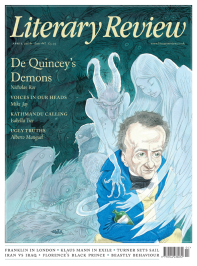Stoddard Martin
Son of Mann
Cursed Legacy: The Tragic Life of Klaus Mann
By Frederic Spotts
Yale University Press 338pp £30
What do you do if your son, who has grown up with privileges you have enabled, behaves in a way that threatens not only his own wellbeing but also that of your family? This question lurks behind Frederic Spotts’s febrile, compulsive account of the career of Thomas Mann’s talented, wayward and depressive eldest son, Klaus, the author of numerous novels, essays, lectures and plays during the period when Nazism stalked Europe. Spotts subscribes to a fashionable thesis that the way Thomas Mann brought him up was a prime cause of his son’s demise, aged forty-two, in the aftermath of the Second World War. Klaus’s fatal overdose, whether accidental or intended, stemmed from a Todessehnsucht that may be ascribed to genes – Thomas’s sisters both took their own lives – or to a variant strain of the German Romantic disease. It is also the type of finale pathétique that the author of a biographical novel about Tchaikovsky had long been honing.
Klaus and his elder sister, Erika, were sometimes taken as twins, though they were born a year apart. In youth they could have been models for Cocteau’s Les Enfants Terribles (Klaus in fact later adapted his French exemplar’s drug-driven novel for the theatre). They revelled in pranks as children, amateur

Sign Up to our newsletter
Receive free articles, highlights from the archive, news, details of prizes, and much more.@Lit_Review
Follow Literary Review on Twitter
Twitter Feed
Under its longest-serving editor, Graydon Carter, Vanity Fair was that rare thing – a New York society magazine that published serious journalism.
@PeterPeteryork looks at what Carter got right.
Peter York - Deluxe Editions
Peter York: Deluxe Editions - When the Going Was Good: An Editor’s Adventures During the Last Golden Age of Magazines by Graydon Carter
literaryreview.co.uk
Henry James returned to America in 1904 with three objectives: to see his brother William, to deliver a series of lectures on Balzac, and to gather material for a pair of books about modern America.
Peter Rose follows James out west.
Peter Rose - The Restless Analyst
Peter Rose: The Restless Analyst - Henry James Comes Home: Rediscovering America in the Gilded Age by Peter Brooks...
literaryreview.co.uk
Vladimir Putin served his apprenticeship in the KGB toward the end of the Cold War, a period during which Western societies were infiltrated by so-called 'illegals'.
Piers Brendon examines how the culture of Soviet spycraft shaped his thinking.
Piers Brendon - Tinker, Tailor, Sleeper, Troll
Piers Brendon: Tinker, Tailor, Sleeper, Troll - The Illegals: Russia’s Most Audacious Spies and the Plot to Infiltrate the West by Shaun Walker
literaryreview.co.uk